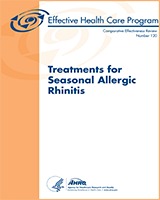NCBI Bookshelf. A service of the National Library of Medicine, National Institutes of Health.
Glacy J, Putnam K, Godfrey S, et al. Treatments for Seasonal Allergic Rhinitis [Internet]. Rockville (MD): Agency for Healthcare Research and Quality (US); 2013 Jul. (Comparative Effectiveness Reviews, No. 120.)
This publication is provided for historical reference only and the information may be out of date.
Good: Meets all criteria outlined below.
Fair: Generally comparable groups are assembled initially but some question remains whether some (although not major) differences occurred with follow-up; measurement instruments are acceptable (although not the best) and generally applied equally; some but not all important outcomes are considered; and some but not all potential covariates are accounted for. Intention to treat analysis is performed.
Poor: Studies will be graded “poor” if any of the following flaws exists: groups assembled initially are not close to being comparable or maintained throughout the trial; unreliable or invalid measurement instruments are used or not applied at all equally among groups (including not masking outcome assessment); and key covariates are given little or no attention. Intention to treat analysis is lacking.
Criteria
- Initial assembly of comparable groups:
- For RCTs: potential covariates appropriately distributed
- For cohort studies: potential confounders controlled
- Maintenance of comparable groups ≈ < 20% loss to follow-up in each arm
- Measurements equal, reliable, and valid
- Interventions comparable and clearly defined
- All important outcomes considered
- Analysis:
- For RCTs: intention-to-treat, covariate adjustment
- For cohort studies: adjustment for potential confounders for cohort studies
- Other aspects of analyses appropriate (e.g. missing data, sensitivity analyses)
- United States Preventive Services Task Force (USPSTF) Criteria for Randomized Co...United States Preventive Services Task Force (USPSTF) Criteria for Randomized Controlled Trials (RCTs) - Treatments for Seasonal Allergic Rhinitis
Your browsing activity is empty.
Activity recording is turned off.
See more...
